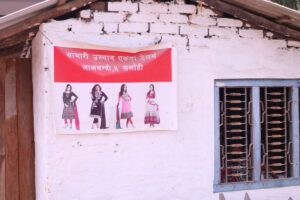
Chandra Urau, 36, a resident of Morangg Rangeli 2, used to be busy with labor works all day. It was difficult for him to upbring 3 daughters and a son in the everyday income he would earn. He had stressful days every day. He would beg for some money with another person to sustain the family. Sometimes he would not get the money and the couple would sleep hungry once they manage something for children.
However, his time has changed in the last two years. One of the landlords near his home had 41 katha field that was turned into a bush with thatch grass. SUS took the land on rent with the
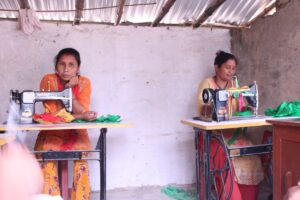
promise of paying 1 thousand per katha on yearly basis. Then SUS handed over the land to Chandra’s family so that he could start farming.
For many days, Chandra and his family members worked hard to cleanse the thatch bush. He also started to plough the land with support of SUS. Chandra and other people who were not used to growing vegetables, were given vegetables growing training and required equipment and seeds also. They also dug boring with common efforts. SUS provided a pump-set so that they can pump required water. Then they grew various vegetables like potato, leaf mustard, cabbage etc. SUS also provided various pesticides, spray-tank and other utensils so that plants could grow healthy.
Chandra used to work hard in other people’s field but now he could grow vegetables in the land provided by SUS. He also would go to sell the vegetables to the market. He earns 10 thousand every month by selling seasonal and other vegetables.
Once Chandra started to earn good, he is now saving some amount of money also. Earlier he would spend all his income with no saving habits. He saves 1 thousand in Sana Kisan Laghubitta (a micro finance institution) every month and one hundred in another cooperative, Charchit Mahila Krishi Sahakari Sanstha, formed under the SUS’s project.
Earlier, he used to buy vegetables from the market. Now, he is happy to eat the fresh vegetables he grows with his own efforts. He narrated, “I ate a lot of vegetables from the market. Now, I can eat from my own field as much as I can.” His children eat green vegetables so that proper nutrition has also been supplied to them.
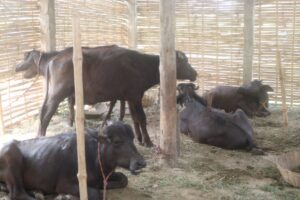
Chandra has grown vegetables in 3 katha land. SUS gave 10 thousand to him so that he could increase his income. From that money, he started to grow boar once he built the shed. There are 12 big boars and 4 small ones in the shed. Earlier, he used to go to the market to sell vegetables in his cycle. But now, he has bought an auto rickshaw.
He took a low interest loan of 3 lakh rupees from Sana Kisan Sahakari to buy an auto rickshaw. Earlier, they used to withdraw high interest loans, 36%, from local rich sáhu. Once SUS helped them to become a member of the SHG and save some money from their pocket, they are now able to withdraw cheap interest  loans. Based on his everyday earnings, he has already paid 55 thousand of total loan to the cooperative. He is planning to pay all the debts in the upcoming few months.
loans. Based on his everyday earnings, he has already paid 55 thousand of total loan to the cooperative. He is planning to pay all the debts in the upcoming few months.
Chandra uses his auto to carry vegetables upto the market so that he can sell. Moreover, he uses auto to carry manures and other pesticides necessary to grow vegetables. Whenever he is free from vegetable selling, the auto is used to carry passengers. Though he works for a few hours only, he earns 300 rs every day from passengers who prefer to ride his auto.
In their experience of group vegetable farming, it has been quite easier for them to manage irrigation, manures and seed. It’s cheap when all of them are bought in bulk and also, they can take measures together to cure plants from several diseases. He earned 15 thousand recently after selling radish and mustard green vegetables in nearby Karsia bazar. He had felt utter happiness that day.
Like in Morangg, Rangeli, SUS is practicing the same group activities in Haripur Municipality of Sarlahi and Chitawan, Madi. Musahar people from Sarlhai, Haripur, in severe poverty are taking advantage of technical and economic support provided by SUS.
SUS created two SHGs of Musahar women in Haripur Municipality. As Musahar do not have land of their own, it was difficult for them to graze boar beside their home. A couple have grown in their home. Their neighbors did not like it because the cattle would litter everywhere. To uplift Musahar from these problems, SUS gave boar grazing training to Laxmi Woman’s Group and Janaki Woman’s Group. SUS arranged one kattha land nearby to build a shed for the boar. It also paid the rent of a year for the group so that they can graze boar. The shed was built in support of SUS. Also, a water pump was managed nearby.
Now, 21 boars are growing up by 2 SHGs of 20 Musahar women in collective way. They have arranged to take care of the boar. Dulari Devi Majhi and Param Devi Majhi have been leading in group boar grazing. Param Devi said, “when we grow boar at home, we have to face health related problems. Now, there is easy access to vet doctors because they know about group boar grazing, we are doing.” The group members are grazing boar with the easy and cheap interest loan provided by the group’s savings. Param Devi also took a 3500 rs loan with 6% interest from the group and bought a baby boar. She had to bear 36% interest only if she had taken the loan from locals.
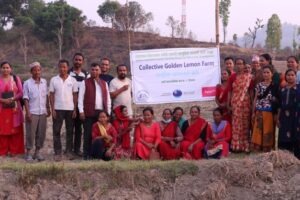
Now, they sell the meat of the boar they had grown. This is more profitable than selling live boar in the market. Anyone in the group in need of money sells the boar and manages the expenses. Kalpana Majhi’s brother’s limbs were broken in an accident; and she had lack of money for the medical treatment. The group sold meat and collected 26 thousand rupees to give to Kalpana so that she could manage the treatment of her brother.
Param Devi used to work as a laborer in a brick factory, but now she has learned many things once she started to lead group boar grazing. She said, “As I am used to speaking for people in groups and helping to solve their problems, I am no more afraid of putting my voice in front of somebody.” Now, they are in process of registering group cattle grazing in the municipality office. She said, “we think we can get government support once we are registered.”
SUS has promoted the practice of collective vegetable growing in Sarlahi Haripur Municipality 4. SUS supported to rent 6 kaththa land and arranged for the collective vegetable farming for 6 families. Among the members, Mohandas Tatma is one. He said that, despite vegetable growing training from SUS, he also knew the way of irrigation, using pesticide items. He also shared that SUS’s training taught him many things that helped earn a good sum of money in a year. He said, “We have learned many things. I am sure that we will be able to earn profit more than what we expect.”
Alike in Sarlahi, the group farming of lemon and turmeric and buffalo grazing has been started in Chitwan Madi. From these group learning, once they started to earn common knowledge, they have been sharing experiences together. SUS had engaged the locals in group farming of lemon and buffalo grazing after giving the proper training.
A group of 10 women have been grazing calf-buffalos (pàdà) in a collective way. In order to graze the buffalos, SUS had helped construct modern type sheds. Sharada Gayak, a local from the area, is also engaged in grazing buffalo. She has experienced that there are no difficulties of looking after the cattle by whole family members when it is done at home. In a group, they work together.
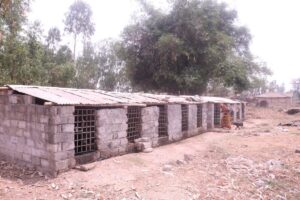
The underprivileged community people are engaged in collective turmeric and lemon farming. SUS has taken 31 kattha land in rent for the same work. A well is built and a motor to lift water is also bought under SUS’s support. A group of 10 people for lemon farming in 21 kaththa and a group of 5 people in farming turmeric in 10 kattha land is managed. Sunmaya Tamang, from Janchetana Woman’s Group, did not know many things about lemon farming before. She joined SUS and got training to growing lemon and turmeric. She knew how to take care of lemon in various production processes via training she got.
|
|||
| Name of the collective initatives | Address | Number of Members | Number of Direct Beniificiaries |
| Taiwan Collective Calf Buffalo Farming | Hariyon 10, Sarlahi | 6 | 30 |
| Samari Collective Golden Lemon Farming Initatives | Madi-8, Chaukidanda, Chitwan | 10 | 58 |
| Samari Collective Vegetable Farming | Rangeli-2, Morang | 5 | 30 |
| Samari Collective Boar Farming | Haripur-5, Asanma, Sarlahi | 20 | 120 |
| Samari Collective Calf Buffalo Farming | Haripur-2, Hattisar, Sarlahi | 6 | 35 |
| Samari Collective Vegetable Farming | Haripur-2, Hattisar, Sarlahi | 6 | 38 |
| Samari Collective Turmeric Farming | Madi-8, Chaukidanda, Chitwan | 5 | 30 |
| Samari Collective Calf Buffalo Farming | Madi-8, Kantipur, Chitwan | 10 | 53 |
| Samari Collective Ekata Tailoring | Lalbandi-5, Sarlahi | 4 | 35 |
| Samari Collective Vegetable Sheed Production Center | Madi-8, Kharkatta, Chitwan | 5 | 25 |
| Samari Collective Chepang Women Boar Farming | Madi-9, Raidanda, Chitwan | 10 | 50 |
| Collective Calf Buffalo Farming | Lalbandi-5, Sarlahi | 6 | 35 |
| Collective Shop and Detergent Production | Lalbandi-5, Sarlahi | 7 | 35 |
| Collective Panchebaja Women Group | Madi-8, Kantipur, Chitwan | 10 | 50 |










Discussion about this post